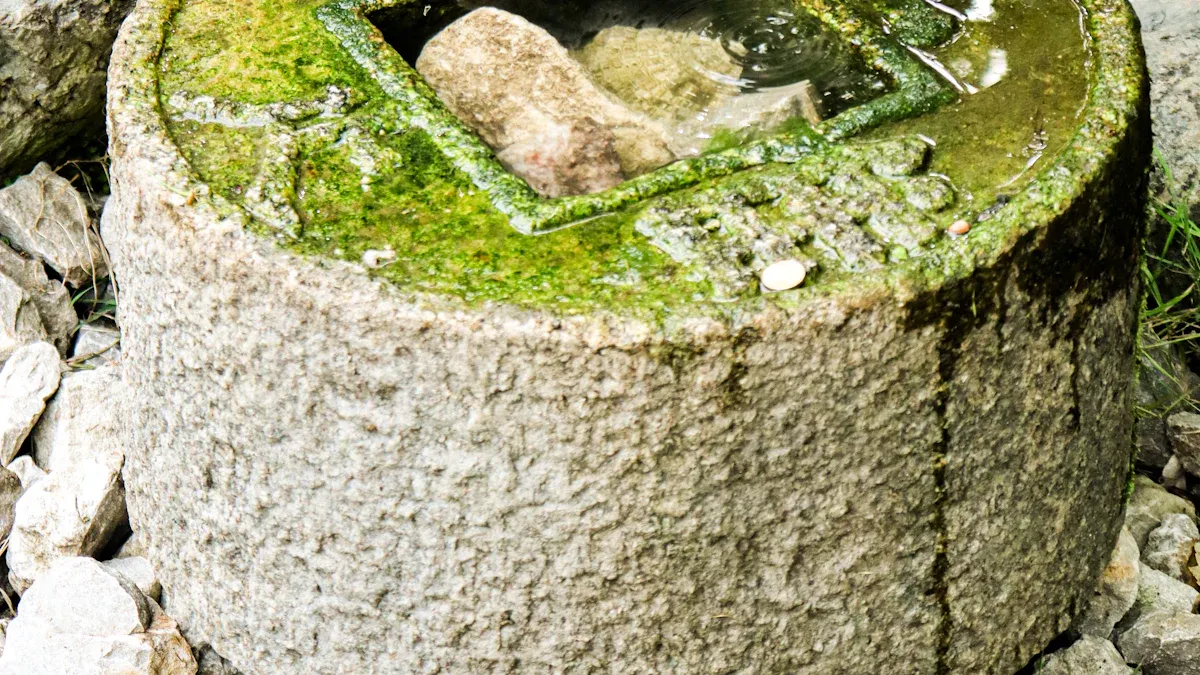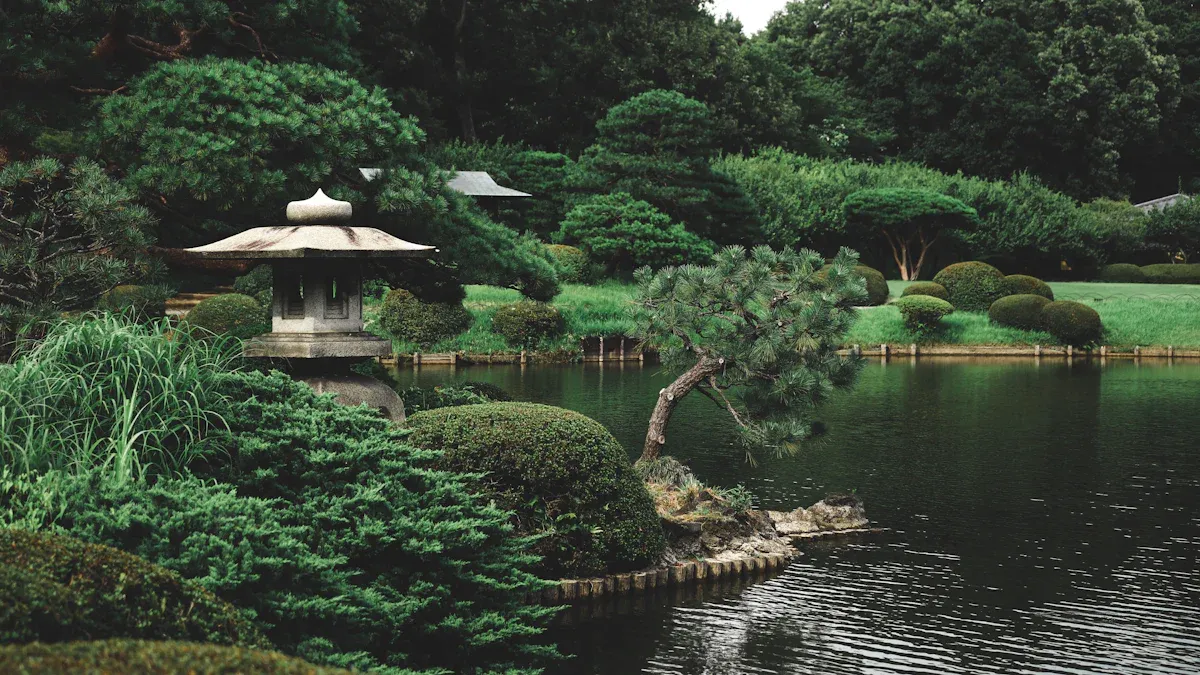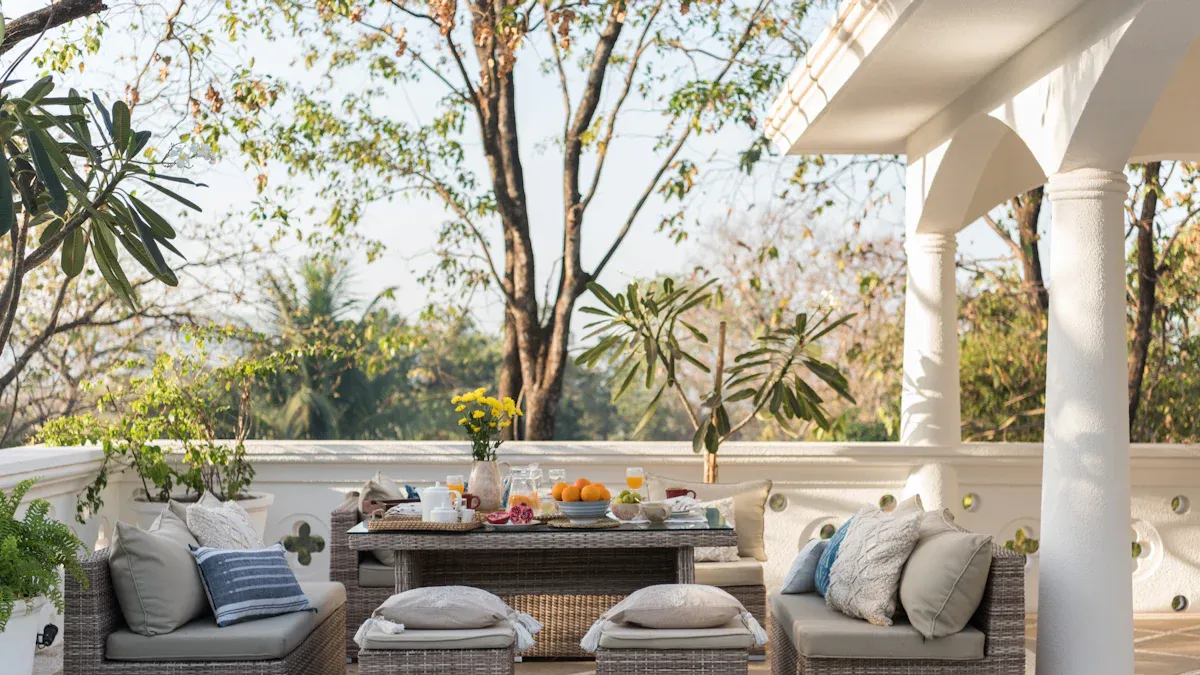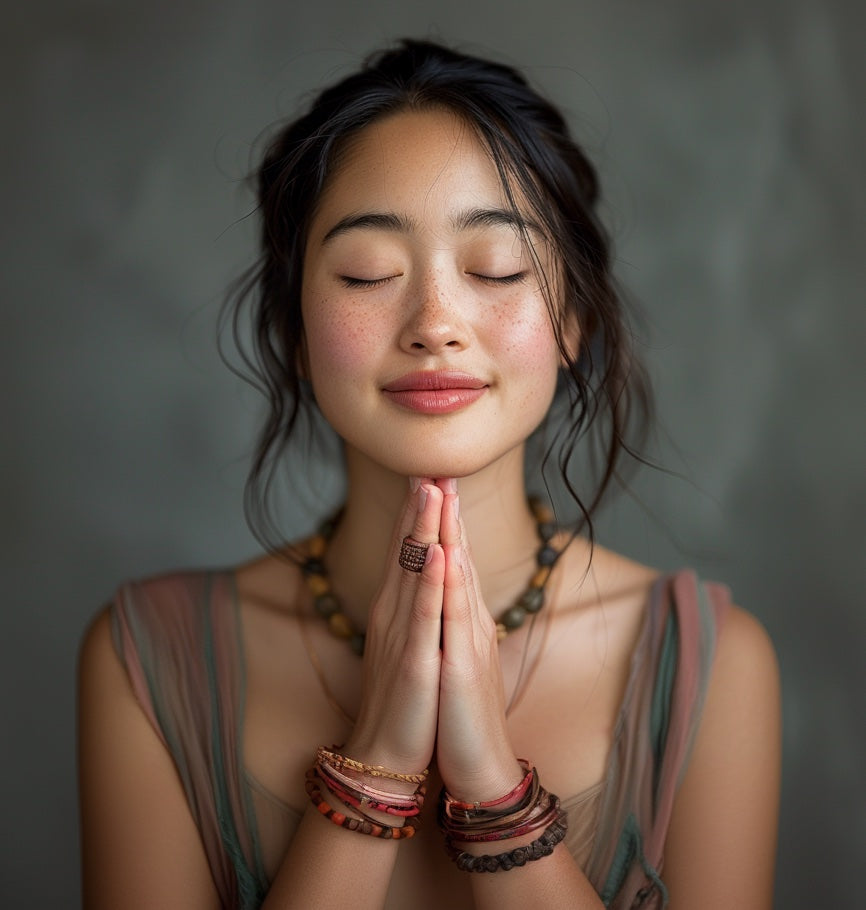
Imagine you walk into your garden and feel calm right away. Feng shui outdoor design helps bring balance and good energy to any yard. Experts say lots of plants and moving water make your outdoor spot feel peaceful. You do not need a big backyard to relax. A small, well-planned garden can be your favorite place. Think about what your perfect relaxing space looks like. Decide that your space will help you feel happy and peaceful.
Key Takeaways
Use Feng Shui ideas to make your outdoor space calm and balanced. This helps your yard feel peaceful and welcoming.
Add the five elements: wood, fire, earth, metal, and water. Use colors, shapes, and materials for each element. This brings harmony and good energy.
Make paths that curve and keep entryways clear. This lets energy move easily. It also makes your garden open and relaxing.
Pick healthy plants with round or heart-shaped leaves. Put them in places that match the Bagua map. This helps you reach your goals.
Add water features, comfy seats, and special decorations. These things make your space relaxing. They also bring good energy and help people connect.
Feng Shui Outdoor Design Basics

What Is Feng Shui?
You might wonder what feng shui outdoor design really means. Feng shui is an ancient Chinese practice that helps you arrange your garden and outdoor space to bring harmony and positive energy. When you use feng shui outdoor design, you focus on how Qi flows through your garden. You want to create a well-designed outdoor space that feels peaceful and balanced.
Feng shui outdoor design looks at the shapes, colors, and materials in your garden. You use these to guide the energy and make your outdoor space feel welcoming. When you walk into your garden, you should feel relaxed and happy. The goal is to create balance between nature and your living area.
Tip: Try standing in your garden and notice how you feel. If you feel calm, you probably have good Qi flow. If you feel uneasy, you might need to adjust your garden layout.
The Five Elements
The five elements of feng shui—wood, fire, earth, metal, and water—play a big role in your garden. Each element brings its own energy and helps you create balance in your outdoor space. You can use colors, shapes, and materials to represent each element.
Wood: Green plants, trees, and rectangular shapes. Wood brings growth and vitality to your garden.
Fire: Red flowers, sunlight, and triangular shapes. Fire adds excitement and warmth.
Earth: Yellow or brown stones, soil, and square shapes. Earth gives stability and support.
Metal: White or gray decor, round shapes, and metal objects. Metal brings clarity and precision.
Water: Blue or black water features, wavy shapes, and ponds. Water creates calm and flow.
The five elements interact in two main ways. The generating cycle helps each element support the next. For example, wood feeds fire, fire creates earth (ash), earth produces metal, metal holds water, and water nourishes wood. The controlling cycle keeps the elements from clashing. Water controls fire, fire melts metal, metal cuts wood, wood depletes earth, and earth shapes water. In your garden, you want to use the generating cycle to create harmony and avoid clashes.
Element |
Color |
Shape |
Example in Garden |
|---|---|---|---|
Wood |
Green |
Rectangle |
Trees, shrubs |
Fire |
Red, orange |
Triangle |
Sunlight, lanterns |
Earth |
Yellow, brown |
Square |
Stones, soil |
Metal |
White, gray |
Round |
Sculptures, planters |
Water |
Blue, black |
Wavy |
Pond, fountain |
The Bagua Map
The Bagua map is a special tool in feng shui outdoor design. It comes from ancient Chinese traditions and helps you organize your garden for harmony. The Bagua map divides your outdoor space into nine sections, each linked to a part of your life, like health, family, or wealth. You use the map to set intentions and place garden features in the right spots.
In traditional Chinese settlements, people used the Bagua map to guide the layout of homes and gardens. They often placed buildings facing south for sunlight and warmth. You can use the same idea in your garden. Place water features in the north for career luck, add metal objects in the west for creativity, and plant trees in the east for family growth.
Note: When you design your garden with the Bagua map, you connect your outdoor space with nature and your personal goals. This helps you create balance and harmony in your life.
Try walking around your garden and imagine each area as part of the Bagua map. Think about what you want to improve, like health or relationships, and add features that match the element for that section. You will notice more positive energy and a peaceful feeling in your outdoor space.
Assess Your Space
Energy Flow and Entryways
Take a moment to stand at the entrance of your garden. This spot is where Qi enters your outdoor space. The way you design your entryway shapes the easy flow of energy into your home and garden. You want to make this area feel open and welcoming.
Place pairs of soft, rounded plants on each side of your door. This creates a balanced look and brings lively energy.
Keep the entrance clean and free from clutter or sharp-edged plants. This helps positive energy flow smoothly.
Try using a red doormat or painting your front door red. These colors attract good luck and success.
Add a small fountain or water feature near the entrance. Flowing water stands for wealth and helps the easy flow of Qi.
A simple, balanced entryway lets you enjoy a steady, positive energy flow from your garden into your home.
Declutter and Clean
Look around your garden and outdoor areas. Do you see old pots, broken tools, or piles of leaves? These things block energy flow and make your outdoor space feel heavy. When you clear the clutter, you help Qi move freely.
Studies show that decluttering can lower stress and help you feel calm and in control. People who keep their spaces tidy often sleep better and feel happier. Even though most research focuses on indoor spaces, the same ideas work outside. A clean garden supports easy flow and helps you relax.
Tip: Make a habit of picking up debris and trimming plants. You will notice your garden feels lighter and more peaceful.
Set Your Intention
Before you start improving feng shui in your outdoor space, think about what you want from your garden. Do you want a place to relax, play, or grow food? Setting a clear intention helps you design your garden for easy flow and positive energy flow.
Write down your goal for your garden. Place a symbol or special object in your outdoor space to remind you of your intention. Each time you walk through your garden, you will feel more connected to your purpose and enjoy the benefits of a well-designed outdoor area.
Feng Shui Gardening Essentials
Plant Selection
Picking the right plants is important for your feng shui garden. You should choose plants that look healthy and have round or heart-shaped leaves. These leaf shapes help make your garden feel calm and gentle. Experts say round leaves bring harmony. Heart-shaped leaves help people feel love and togetherness. Spiky plants, like cacti, can seem harsh. If you use spiky plants, put them near doors for protection. Do not put them in places where you want to relax.
Here is a simple guide for good feng shui plants:
Plant Name |
Symbolic Meaning / Feng Shui Benefit |
Care Notes / Placement Tips |
|---|---|---|
Philodendron Heartleaf |
Love, balance, partnership; brings calmness |
Bright indirect light, mild temperature, high humidity |
Golden Pothos |
Growth, renewal, wealth; boosts positivity |
Medium indirect light, weekly watering, high humidity |
Jade Plant |
Attracts wealth, prosperity, good fortune |
Near the entrance or southeast corner; bright indirect light |
Money Tree |
Brings wealth; popular office plant |
Bright filtered light, moderate to high humidity |
Lucky Bamboo |
Enhances ambiance, purifies air, boosts positive energy |
Bright indirect light, average indoor humidity |
Lemon Tree |
Growth, good health, good for new beginnings |
East-facing, 8 hours of full sunlight, warm and humid |
Chinese Money Plant |
Good luck and prosperity, pet-friendly |
Medium to bright indirect light, weekly watering |
Laurentii Snake Plant |
Fortune, longevity, health, creativity |
Front-house placement, bright indirect light |
Anthurium Clarinervium |
Love and peace; positive energy magnet |
Bright filtered sunlight, high humidity |
Bird of Paradise |
Joy, luck, fortune; excitement |
Bright direct light, low maintenance |
Baby Rubber Plant |
Nourishment, well-being, fertility |
Medium to bright indirect light, tolerates low light |
Burgundy Rubber Tree |
Stability, balance, transformation |
Northeast-facing, bright indirect light |
Fittonia |
Positive energy, good luck; pet-friendly |
Bright indirect light, high humidity |
You can use the bagua map to help place your plants. Put a Jade Plant in the southeast for wealth. Place a Snake Plant near the front door for protection. Studies show that adding plants can make you feel happier and help you focus. Plants can also help you stay healthy. When you plan your garden, think about what each plant adds to your space.
Tip: Do not put too many plants close together. Give each plant space to grow. This helps Qi move easily and keeps your garden open and peaceful.
Curved Pathways
The shape of your garden paths is very important. In feng shui gardening, curved paths help Qi move gently. Straight paths or sharp turns can block energy. This can make your garden feel tense. Curved paths help you slow down and enjoy your walk.
Experts say curved paths help energy flow. This flow is good for your plants and for you. Walking on a winding path helps you relax. Your garden feels more like a quiet getaway. Curved paths also connect different parts of your garden. This makes your yard feel balanced and whole.
Use gravel, stepping stones, or soft grass for gentle curves.
Do not put sharp objects or obstacles on the path.
Let plants grow over the edges for a peaceful look.
If you want your garden to feel better, look at your paths. Even small changes, like adding a curve or moving a pot, can help your garden feel nicer.
Color and Element Balance
Color is very important in feng shui gardening. Each color matches one of the five elements: wood, fire, earth, metal, and water. When you balance colors and materials, your garden feels calm and supports your life.
Here is a simple table to match colors and materials with the five elements:
Element |
Associated Colors and Materials |
Symbolic Meaning |
Recommended Outdoor Placement |
|---|---|---|---|
Water |
Water features, blue, black |
Career, wealth, relaxation |
North quadrant |
Earth |
Stones, boulders, yellow, beige |
Relationships, grounding |
Southwest, Northeast |
Metal |
Sculptures, wind chimes, white, silver, gray |
Luck, calm energy |
West, Northwest |
Wood |
Wooden structures, green |
Health, growth, wealth |
East, Southeast |
Fire |
Firepits, red, lighting |
Passion, fame, warmth |
South |
Try to use natural materials when you can. Put a water feature in the north for relaxation. Add stones in the southwest for grounding. Use green plants in the east for health. Red flowers or lanterns in the south bring warmth. Metal decorations in the west or northwest bring luck and helpful people.
Note: You do not need every color or element in the same amount. Trust how you feel and notice your garden’s mood. The goal is to make your garden feel balanced and support your wishes.
When you use these ideas, your garden will feel peaceful and full of good energy. Every choice, from picking plants to shaping paths to choosing colors, helps you enjoy feng shui gardening.
Creating a Relaxing Outdoor Retreat

Seating and Togetherness
You want your outdoor retreat to feel welcoming. Group chairs and benches so people can face each other. This setup makes it easy to talk and connect. When you arrange seating in a circle or semi-circle, you create a space for laughter and sharing stories. You can use a table in the middle for snacks or games. Place seats where you get natural light. This helps everyone feel cheerful and relaxed.
Arranging seats for conversation brings people closer.
Privacy in seating areas makes your retreat feel safe.
Natural light boosts mood and energy.
A cozy seating area supports harmony and helps you enjoy time with friends and family. You build a retreat that feels like a true zen haven.
Comfortable Furniture
Pick furniture that feels soft and sturdy. You want chairs and sofas with cushions for comfort. Try adding a hammock or a lounge chair for a zen vibe. If you choose weatherproof materials, your outdoor retreat stays nice all year. Place furniture where you can see plants and water features. This view helps you relax and enjoy the peaceful energy of your retreat.
Furniture Type |
Comfort Level |
Best Placement |
|---|---|---|
Cushioned Sofa |
High |
Near garden center |
Hammock |
Very High |
Under shady tree |
Lounge Chair |
High |
Beside water feature |
Bench |
Medium |
Along curved pathway |
You create comfortable rest areas by mixing soft seats and nature views. Your retreat becomes a place for zen relaxation and happy moments.
Movement and Lightness
Keep pathways open and clear. Move furniture so you do not block the flow of Qi. Open spaces let energy move freely. You feel light and calm when you walk through your outdoor retreat. Curved paths and neat layouts slow you down and help you enjoy each step. Avoid clutter and crowded corners. Your retreat feels balanced and fresh.
When you design your outdoor retreat with movement and lightness, you invite zen energy and peace. Every step feels easy, and your mind stays clear.
Arrange for Harmony
Water Features
Adding water features can help your garden feel peaceful. Water means luck, wealth, and good energy in Feng Shui. A fountain or pond can bring good luck to your yard. Put water features in the north, east, or southeast. The north helps your job and life path. The east is good for family and health. The southeast brings money and plenty.
Tiered fountains make your garden calm and balanced.
Modern fountains look fancy and stylish.
Stone or metal fountains change the feel of your yard.
Do not put water features under stairs or near bedrooms.
Tip: A small fountain by your front door brings luck and lets Qi move into your house.
Outdoor Decor and Symbols
Decor and symbols set the mood in your outdoor space. Each one has a special meaning and helps with harmony. Here is a simple guide:
Outdoor Decor Item/Symbol |
Symbolic Meaning in Feng Shui |
Traditional Use to Attract Energy |
|---|---|---|
Pairs of identical plants |
Good luck, fortune, abundance |
Place on each side of entryways |
Water (pond, fountain, waterfall) |
Wealth, prosperity, good fortune |
Add to garden for positive energy flow |
Rocks |
Protection from negative energies |
Use in garden to shield and stabilize energy |
Plants and flowers (no sharp edges) |
Healing, positive vibes, harmony |
Add for a balanced, peaceful atmosphere |
Natural fences (trees, bushes) |
Protection from noise and pollution |
Use as barriers around your garden |
Round-shaped furniture |
Smooth energy flow, harmony |
Use in seating areas for pleasant conversations |
Colors (various) |
Different energies by color |
Choose colors for desired energy (red for success, green for growth) |
You can mix these items to fit what you want. Use round tables for friendly talks. Place rocks to help protect your space.
Open Pathways
Paths show you where to walk in your garden. You want paths that are easy to follow and connect every spot. Curved paths look nice and make you want to explore. Wide, clear paths help everyone walk safely, even kids and older people.
Paths help you move and connect each area.
Curves and soft turns make your garden calm and fun.
Wide paths let people walk together and feel welcome.
Good lights and safe ground keep your garden easy to use.
Clear paths help you enjoy all parts of your yard.
Open paths let Qi move well and make your garden feel friendly and balanced.
Feng shui can turn any outdoor space into a peaceful retreat. You do not need a huge yard to feel the change. Even small steps, like adding curved paths or a water feature, can boost harmony and relaxation. Real-life gardens, such as the Zen garden and the Yin and Yang Garden in Suzhou, show how balance and thoughtful design create calm. Start with one change and watch your space transform. You can build a welcoming, balanced garden that lifts your mood every day. Why not begin your feng shui journey today?
FAQ
What if I have a small outdoor space?
You can still use Feng Shui in a small area. Focus on a few healthy plants, a small water feature, or a cozy seat. Even a balcony or patio can feel peaceful with the right touches.
Do I need special tools or expensive items?
No, you do not need fancy tools. Use what you have. Try moving furniture, adding plants, or using stones and water. Simple changes can make a big difference in your outdoor space.
How often should I update my Feng Shui garden?
Check your garden each season. Trim plants, clean up clutter, and see how you feel in the space. If something feels off, move things around until you feel calm and happy again.
Can I use Feng Shui if I rent my home?
Yes! You can use pots, portable water features, and lightweight furniture. These items move easily when you do. Feng Shui works anywhere you live.
What if I do not know much about Feng Shui?
Start small. Try adding one plant or a curved path. Notice how your space feels. You can learn more as you go. Feng Shui is about balance and feeling good in your space.






